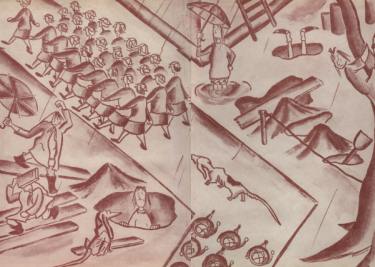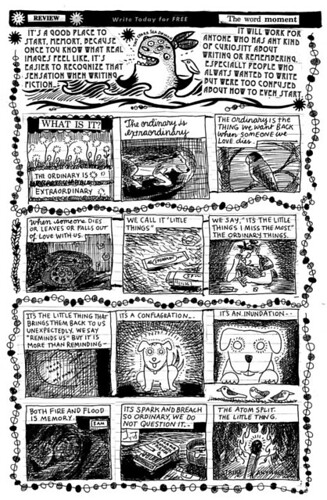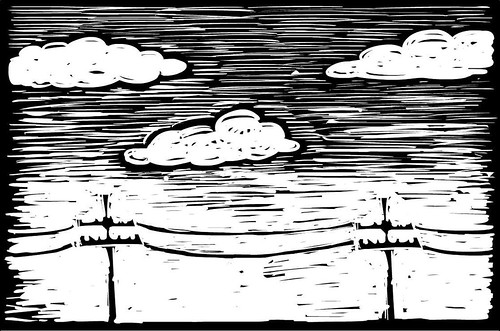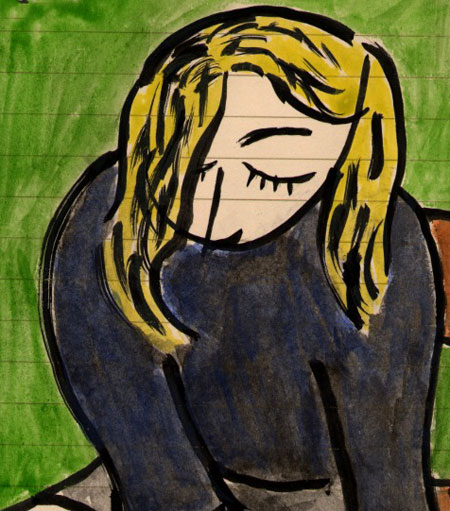
UPDATE 7/8/2011: Fantagraphics is putting out a collection of O’Connor’s cartoons, and I’ve archived a lot more here.
Few people know this, but Flannery O’Connor, one of my favorite writers, was also a cartoonist. She started out publishing cartoons in her high school and college newspapers, then tried to publish some in the New Yorker as a way to make money so that she could write her fiction. (That didn’t quite work out.) A few folks have noted that cartooning probably had some effect on writing her style: dig her grotesque caricatures and gift for combining the comic and the serious.
Here’s some more background from Georgia College’s Library Special Collections page for their Flannery O’Connor collection:
Flannery O’Connor’s first published works were her cartoons published in the Peabody Palladium, the student newspaper at O’Connor’s high school. According to the Palladium, by the end of 1941, O’Connor had written and illustrated three books about geese: Mistaken Identity, Elmo, and Gertrude, which O’Connor was unable to publish. The same article mentions Mary Flannery O’Connor’s school notebook, which was painted with oils and covered with cellophane. Around this same time O’Connor was also designing handmade lapel pins which were for sale at a local store in Milledgeville.
O’Connor’s career as a cartoonist continued at Georgia State College for Women when her cartoons began appearing as early as October 1942 in the college newspaper, the Colonnade. O’Connor’s cartoons depict humorous views of life on campus including , school performances, social activities, studying, and life on campus with the WAVES.
During her years at GSCW her cartoons appeared in almost every publication the college produced including the alumni magazine, the literary magazine, and on a weekly basis in the newspaper, the Colonnade. In 1944 O’Connor was appointed Art Editor of the college yearbook, the Spectrum, and designed numerous cartoons for the 1944-1945 yearbook, including the inside covers depicting campus scenes. In 1944 O’Connor also submitted cartoons to The New Yorker, but the magazine was not interested in publishing them.
Many of O’Connor’s published cartoons were linoleum-block prints. Linoleum-block printing involves cutting or etching an image on to a linoleum sheet. In O’Connor’s case, she attached the linoleum to a piece of wood, applied a solid color of ink to the linoleum cutting, and printed the image on to a piece of paper. The image was then printed in black and white in the final publication.
O’Connor’s interest in creating cartoons continued as she left home in 1945 to pursue a graduate degree in writing at The University of Iowa. Among O’Connor’s first courses at The University of Iowa were two courses in advanced drawing. She hoped to be able to support her writing by selling cartoons to national publications. O’Connor, however, was unable to sell any of her cartoons, at which time she began devoting all of her energy to writing.

“I don’t enjoy looking at these old pictures either, but it doesn’t hurt my reputation for people to think I’m a lover of fine arts.”
A little bit more in depth, from Melissa Simpson’s Flannery O’Connor:
Her cartoons, which she did with a more conventional charcoal or ink and paper technique, instead of linocut, appeared in nearly every [Colonnade] issue while she was a student, beginning in October 1942, and were popular with students. They also frequently satirized the Women Accepted for Voluntary Service (WAVES), who were stationed at GSCW when the U.S. Navy designated the campus as a site for clerical training, for their nonconformity and their disruption of the male-female ratios in Milledgeville. O’Connor was also often critical of students and faculty for their apathy and of the educational establishment in general for its promulgation of weak-mindedness. O’Connor did not reserve her critical eye for everyone but herself, however. In several of her cartoons, she pokes fun at herself, as in the one which portrays a social situation in which everyone is dancing except for a “bespectacled wall flower who grins behind her hand and asserts that she can always pursue a Ph.D.”
Aspects of O’Connor’s personality and interests that find their way into her later writings are also evident in her early visual work. For example, her signature on the Colonnade cartoons consists of her initials, MFOC, formed into the shape of a bird, a childhood interest that she kept throughout her life. Like her fiction, her cartoons demonstrate her ability to illuminate the absurdities of social convention or of simple everyday life with a combination of seriousness and humor. While many of the instructors and administrators at GSCW appear to have looked at her cartooning with some disdain, O’Connor held a different opinion of the artistic medium. Even though she came from the area’s “aristocracy,” she despised pretentiousness and saw cartooning as just as valid as writing, charcoal sketching, or oil painting….Although several of her contemporaries expected her to find fame through her visual art, that focus eventually shifted to a near total focus on her written art; however, Robert Fitzgerald has noted that she admired the work of New Yorker cartoonist George Price a great deal, and of all the books in her personal library, only one is about art: a book on French artist Honore Daumier whose work helped shape the work of many cartoonists.
Jean W. Cash’s Flannery O’Connor: A Life goes into even more detail about her college days:
During her three years at GSCW O’Connor produced a linoleum block cartoon for each issue of the Colonnade….[asked] to describe how she “went about her work”…O’Connor explained that “first–she caught her ‘rabbit.’ In this case…the ‘rabbit’ was a good idea, which must tie up with some current event of a recent happening on campus…”
Unfortunately, the two images above are the only ones I could find on the net…if anybody has other links, I’d love to see them.




